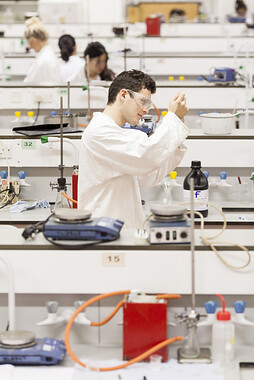A study investigating the use of pharmacogenetics tools in guiding the prescription of psychotropic drugs
Background

In clinical practise, there appears to be a trial-and-error approach to selecting the most appropriate medication for a patient. Often this involves clinicians prescribing two or more antipsychotics in varying dosages before finding one with acceptable efficacy and tolerable side effects. After we take any drug, our body needs to break it down and get it to the desired area and many factors can influence not only this process, but how we respond to it.
Factors can range from age to environment to genetics. Everyone’s genetic information is different and a genetics-guided approach tailors’ treatment to everyone. It is possible that genetic differences could explain why some patients respond to their treatment better than others and why some patients experience severe side effects.
By running this study, we seek to investigate if genetic profiling can help optimise the prescribing of psychotropic medications and lead to improved clinical outcomes and reduced side effects. This project aims to fill this gap by conducting a study to investigate the use of a pharmacogenetic testing to optimise the management of psychotropic drugs.
- Objectives & Aims
Objective: develop a pharmacogenomic intervention in the NHS to guide the prescribing and dosing of antipsychotic drugs.
Aims:
- To investigate if genetic testing can help reduce adverse drug reactions
- Collect feedback from clinicians on the value of the intervention.
- To evaluate the cost-effectiveness of this intervention
- Eligibility
We are inviting people over the age of 18 who have a clinical diagnosis of a mental illness (such as depression, schizophrenia, or bipolar disorder) to take part in this study to help us to understand more about the treatment of these illnesses. Eligible participants must be currently prescribed or soon to be prescribed antipsychotics.
We plan to recruit at least 420 participants.
- What does the study involve?
What will happen if I take part?
Once you contact the team, you will be sent an information sheet. This must be read to make an informed decision about whether you want to take part. If you decide you would like to take part, you are then expected to sign a consent form. There could be up to two required visits.
Once you have agreed to take part, you will meet with the study team to complete the baseline assessment. This can be done face to face or by telephone / online methods. At the baseline you are required to complete the consent form, questionnaire and give a DNA sample. You will be assigned a unique trial number that we will use to identify you and your sample.
The questionnaire consists of questions regarding your medical history, health, and wellbeing. You will be asked to provide either a blood, saliva or mouth swab sample for genetic analysis. A single blood sample of up to 30ml (3 tubes) or a saliva sample of approximately 4ml (1 teaspoon) is taken.
In addition, you will be asked to do an optional blood test; this is to test the levels of three main chemicals in your blood: glucose (blood sugar), cholesterol and prolactin (a hormone that sometimes increases if you take certain medications) and to measure the amount of medication in your blood.
Your doctor will discuss the results of your genetic test with you and explain what they mean. They might use this information to guide how best to treat you, but they might also decide that no changes are necessary. This will always be discussed with you in detail.
- Follow-up visit
You will be seen again by the study team about three months after the genetic report is sent to your clinician and discussed with you. This could be done face-to-face or by telephone or through online methods. Here we will repeat some, but not all, of the tests you had at the baseline visit.
The tests we will do at this visit are a physical examination, questionnaires on your health and well-being, an optional blood test to measure the amount of medication in your blood and to measure glucose, cholesterol, and prolactin levels.
 Close
Close

